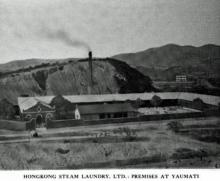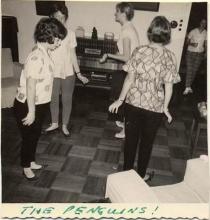Steam Laundry, Yau Ma Tei [c.1905-????]
Primary tabs
Submitted by LizB on Sat, 2022-04-30 01:30
Current condition:
Demolished / No longer exists
Date Place completed:
c.1905-12-12 (Year, Month, Day are approximate)
The steam laundry was located on IL 1157, to the east of the Orient Tobacco Factory and on the (northern) corner of Dundas St and Kwong Wa St, Yau Ma Tei. It is shown on the 1920 Kowloon map, and possibly also the 1952 map.
The laundry is referred to in the 1906 Public Works Report (at 19), as having sustained damage/partial collapse as a result of the typhoon on 18 September 1906. The construction date is not yet known, so 1905 is an estimate.
Tags:



Comments
Hongkong Steam Laundry
From Present Day Impressions of the Far East and Prominent and Progressive Chinese at Home and Abroad
Those who have lived for any length of time in the East are fully aware of the great importance of all matters dealing with public health, not the last being that relating to the cleansing of clothing. Many a case of disease has been traced to the “washerman” in China and the “dhoby” in India, and it is most reassuring to know that this colony possesses a steam laundry under European management where all these risks are eliminated.
The Hongkong Steam Laundry is the largest, most efficient, and most up-to-date concern of this kind east of Suez. The present building was erected by the Laundry Company in 1905, and no expense was spared in equipping it with the most modern plant procurable.
To be thoroughly impressed with the business done by the company one should pay a visit to the laundry during working hours, and view the constant stream of Chinese bringing their employers’ linen to be cleansed or taking it away pure and white as the driven snow. One would be struck also with the happy and contented appearance of the 200 employees, who seem thoroughly to enjoy the performance of their tasks. Not only does the steam laundry cater for the residents of Hongkong, civil, naval, and military, but it takes advantage of the city being a great transitory port. Representatives of the concern board each steamer on its arrival, and clothes are washed, pressed, and packed during the ship’s stay in port. This is a boon greatly appreciated by travellers who perhaps have been wandering through China, or who, it may be, have come up from the sunny, fragrant islands of the South.
The works of the company are at Yaumati, at a spot far removed from the dirt and smoke of the city. The promptness with which work is done and deliveries made speaks volumes for the efficiency of the management and the thorough training of the staff.